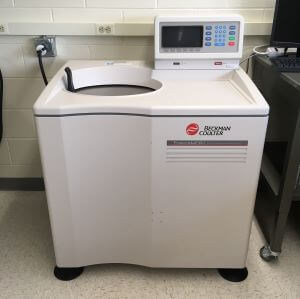Analytical Ultracentrifuge
ProteomeLab XL-I Analytical Ultracentrifuge, Beckman Coulter

An analytical ultracentrifuge consists of a specifically designed ultracentrifuge with integrated optical systems for real-time detection of biomolecules in solution under high centrifugal forces. The distribution of biomolecules in a cell is monitored over time to determine many thermodynamic and hydrodynamic properties. Two types of AUC experiments are typically performed: sedimentation velocity and sedimentation equilibrium experiments. In sedimentation velocity experiments, high speeds are used to pellet the biomolecule of interest. These experiments provide information on biomolecule size and shape. In sedimentation equilibrium experiments, the samples are spun at lower speeds until an equilibrium between centrifugal and diffusion forces is reached. These experiments provide information on the homogeneity of the sample, complex molecular weight, association constants, stoichiometry, and aggregation states.
Features
- Absorbance optical system with a wavelength range of 190 – 800 nm
- NEW CAPABILITY: Rayleigh interference optical system to allow measurement of colorless and high concentration samples. Also useful in multi-signal experiments to analyze multi-component samples
- Temperature control: 0°C – 40°C in 1°C increments
- Instrument max speed of 60,000 RPM
- AN-50 Ti rotor with capacity for 7 analytical cells
- Compatible with wide range of concentrations: ~5 – 1500 µg/mL
- Does not require labeling or immobilization
Applications
- Characterize biomolecular size and shape
- Analyze biomolecular complexes to determine molecular weight, association constants and stoichiometry
- Assess sample purity and homogeneity
Internal Rates
- Sedimentation velocity: $286/run
- Sedimentation equilibrium: $161 for 1st day; $110/additional day
- Data analysis: $51/hr